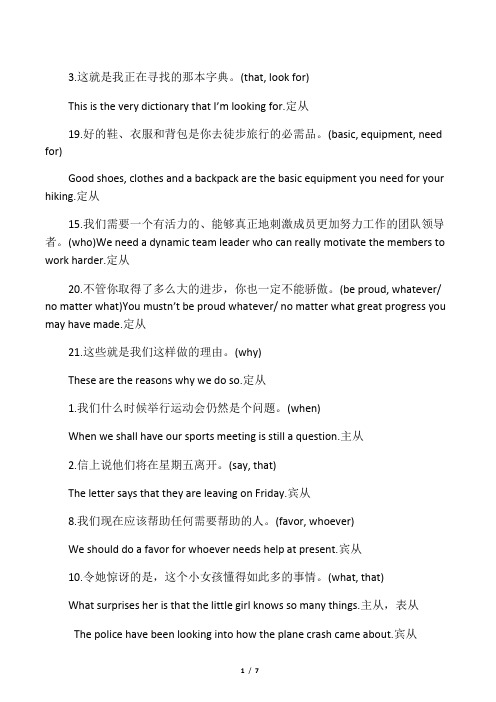复合句的翻译
- 格式:ppt
- 大小:1.14 MB
- 文档页数:38

3.这就是我正在寻找的那本字典。
(that, look for)This is the very dictionary that I’m looking for.定从19.好的鞋、衣服和背包是你去徒步旅行的必需品。
(basic, equipment, need for)Good shoes, clothes and a backpack are the basic equipment you need for your hiking.定从15.我们需要一个有活力的、能够真正地刺激成员更加努力工作的团队领导者。
(who)We need a dynamic team leader who can really motivate the members to work harder.定从20.不管你取得了多么大的进步,你也一定不能骄傲。
(be proud, whatever/ no matter what)You mustn’t be proud whate ver/ no matter what great progress you may have made.定从21.这些就是我们这样做的理由。
(why)These are the reasons why we do so.定从1.我们什么时候举行运动会仍然是个问题。
(when)When we shall have our sports meeting is still a question.主从2.信上说他们将在星期五离开。
(say, that)The letter says that they are leaving on Friday.宾从8.我们现在应该帮助任何需要帮助的人。
(favor, whoever)We should do a favor for whoever needs help at present.宾从10.令她惊讶的是,这个小女孩懂得如此多的事情。

英语中什么叫复合句?复合句(Complex Sentence)由一个主句(Principal Clause)和一个或一个以上的从句(Subordinate Clause)构成。
主句是全句的主体,通常可以独立存在;从句则是一个句子成分,不能独立存在。
从句不能单独成句,但它也有主语部分和谓语部分,就像一个句子一样。
所不同在于,从句须由一个关联词(connective)引导。
复合句(The Complex Sentence):句子中有一个或一个以上的从句,叫做复合句。
复合句可分为:1).定语从句(The Attributive Clause);2).状语从句(The Adverbial Clause);3).名词性从句(The Noun Clause)一、定语从句·定语从句的定义定语从句在句子中作定语,用来修饰一个名词、名词词组或者代词。
·先行词和引导词被修饰的名词、名词词组或代词叫做先行词;在先行词和定语从句之间起连接作用的词叫做引导词。
引导词分为“关系代词”和“关系副词”。
·关系代词和关系副词关系代词有:who, whom, whose, that, which, as。
关系副词有:when, where, why。
注意:关系副词里面没有how。
如果要修饰方式,用that或in which引导,或者不用引导词。
I don’t like the way (that, in which) he eyed me.我不喜欢他看我的那个样子。
·关系代词:who关系动词who在从句中主要作主语,在非正式语体里who还可以作从句中的宾语。
He is the man who wants to see you.He is the man who I saw in the park yesterday.·关系代词:whomHe is the man (whom)I saw in the park yesterday.(whom在从句中作宾语)·关系代词:whosewhose 用来指人或物,(只能用作定语, 若指物,它还可以同of which互换)。

英语复合句的翻译)译文Translation Exercises: (英语复合句的翻译)1.Although television was developed for broadcasting, many important uses have been found that have nothing to do with it.虽然电视是为了广播而发明的, 但是电视还有许多与广播无关的重要用途。
2. This happens when a fact is discovered which seems to contra dict what the “law” would lead one to expect.每当发现一个事实使人感到与该定律应得出的预期结论相矛盾的时候, 就发生这种情况。
3. There’s a possibility we will go, but it all depends on the weather.我们可能去,但要看天气如何。
4. Why he left wasn’t important.他为什么走并不重要。
5. It was uncertain whether he would come or not.他来不来还不肯定。
6. It’s strange that he knows nothing about it.很奇怪他对此竟不无所知。
7. When he’ll be back depends much on the weather.他什么时候回来很大程度上取决于天气。
8. Whether we’ll suc ceed remains to be seen.我们能否成功还要拭目以待。
9. It hasn’t been announced who are the wi nners.谁获胜还没有宣布。
10. It’s no business of yours where I spend my summer.我在哪儿过夏天不干你的事。

复合句例句英语在学习英语的过程中,复合句的学习占据了重要的位置,它是语法中重要的一部分,并且能够帮助我们掌握英语的表达能力。
复合句,也叫并列句,是由两个或更多个句子组成,各句子又分别可以分割成主从句。
主从句通过连词将两个句子形成关联,这种连词叫做连接词。
一些常用的连接词有:and(和)、or(或)、but(但)、so(因此)、yet (然而)、nor(也不)等等。
比如:He speaks English fluently, yet he can not write it very well.他英语讲的流利,但写的不怎么样。
复合句的意思比单独的句子要复杂,而且可以表达更深层次的意义,它由单独句子组合而来,而不是由一系列单独句子表达出来的。
复合句也可以是定语句,也就是我们常说的定语从句。
它使主句更具体,也把它们联系在一起。
例如:The boy who lived next door was very friendly.住在隔壁的那个男孩是非常友善的。
复合句也可以是宾语从句。
它是作为一个句子的宾语,它从句的主语和系动词关系密切,陈述它们之间的变化。
例如:He believes that he can do it.他相信他可以做到。
复合句也有状语从句,状语从句一般用来表示状语,用来修饰主句中的动词、形容词或动词短语,用来表示时间、地点、原因、条件、结果等。
例如:He took a walk after he finished his work.他工作完后,就去散步。
复合句还可以是复合宾语,复合宾语是指宾语后跟着一个介词短语,而介词短语也可以作为复合句的一部分,也就是复合宾语从句。
例如:He found time to look after his mother.他找时间照看他母亲。
复合句是扩大句子表达范围的一种手段,它不仅可以表达更丰富的含义,而且能够更有效地表达意思。
它是一种以主从句相结合的语法结构,在写作中可以帮助增加文章的复杂性、内涵性,用来提高文章的层次感。

复合句中译英1.如果玛丽明天好了,她就会去。
If Mary is all right tomorrow, she will go.2.做完作业后,我上床睡觉了。
I went to bed after I had finished my homework.3.王老师说他认识你。
Mr. Wang said he knew you.4.他说他会把留言放在那张桌子上。
He said that he would leave a message on the desk.5.我们很高兴你邀请我们。
We are glad that you have invited us.6.我对她说的话很感兴趣。
I’m interested in what she has said.7.你知道你父亲是否离开了吗?Do you know if your father has left?8.我没有问她在读什么。
I didn’t ask her what she was reading.9.昨天他没去上学,因为他病了。
He didn’t go to school yesterday because he was ill.10.我们应该学得像我们家长希望的那么好。
We must study so well as our parents hoped.11.玛丽比汤姆大。
Mary is older than Tom.12.电视剧结束后他上床睡觉。
He went to bed after the TV play was over.13.她在这个学校工作之前在哪里学习?Where did she study before she works in this school?14.自从她1987年来到这个小镇就一直在这所医院工作。
She has worked in this hospital since she came to this small town in 1987.15.我一到美国就会给你写信。

复合句-非谓语-翻译一、名词性从句1.What Sarah said showed that she hadn’t decided whether she should stay or not.Sarah’s words showed that she hadn’t decided whether to stay or not.沙拉的话语显示出她还没决定是否要留下。
2.That prices keep going up worries the public.Prices’ keeping going up worries the public.价格的不断上涨困扰着人们。
3.Would you please show me how I can get to the railway station?Would you please show me how to get to the railway station?你能告诉我到火车站怎么走吗?4.That many people in south China received a heavy attack of natural disaster drew closeattention from all over the world.In south China, many people’s receiving a heavy attack of natural disaster drew close attention from all over the world.在中国南方,许多人遭遇到重大的自然灾害引起了全世界的密切关注。
5.Victor apologized for his not being able to inform me the change in the plan.Victor apologized for that he was not able to inform me the change in the plan.维克托为没能通知我计划有变而道歉。
3.这就是我正在寻找的那本字典。
(that, look for)This is the very dictionary that I’m looking for.定从19.好的鞋、衣服和背包是你去徒步旅行的必需品。
(basic, equipment, need for)Good shoes, clothes and a backpack are the basic equipment you need for your hiking.定从15.我们需要一个有活力的、能够真正地刺激成员更加努力工作的团队领导者。
(who)We need a dynamic team leader who can really motivate the members to work harder.定从20.不管你取得了多么大的进步,你也一定不能骄傲。
(be proud, whatever/ no matter what)You mustn’t be proud whate ver/ no matter what great progress you may have made.定从21.这些就是我们这样做的理由。
(why)These are the reasons why we do so.定从1.我们什么时候举行运动会仍然是个问题。
(when)When we shall have our sports meeting is still a question.主从2.信上说他们将在星期五离开。
(say, that)The letter says that they are leaving on Friday.宾从8.我们现在应该帮助任何需要帮助的人。
(favor, whoever)We should do a favor for whoever needs help at present.宾从10.令她惊讶的是,这个小女孩懂得如此多的事情。
英语复合句长句带翻译例句1、We heard the news that our team had won.我听到消息说我们的队伍获胜了。
2、Whether he will come is not clear.他会不会赴会仍是未知数。
3、What he wants to tell us is not clear.他要跟我们说什么,还不清楚。
4、It is known to us how he became a writer.我们都知道他是如何成为一名作家的。
5、He has told me that he will go to Shanghai tomorrow.他已经告诉我他明天要去上海。
6、I insist that she (should) do her work alone.我坚持要她自己工作。
7、She always thinks of how she can work well.她总是在想怎样能把工作做好。
8、You should have put the book where you found it.你本来应该把书放回原来的地方。
9、Much as I respect him, I can’t agree to his proposal.尽管我很尊敬他,我却不同意他的建议。
10、Food is to men what oil is to machine.食物之于人,犹如油之于机器。
11、As (he was) young, he learned how to ride a bike.他小时候就学会了骑自行车。
12、Whenever (she is) free, she often goes shopping.她有空就去逛商店。
13、Work hard when (you are) young, or you'll regret.少壮不努力,老大徒伤悲。
14、He won't go there with us unless (he is) invited.除非受到邀请,否则他不会和我们一道去那里。